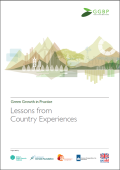Countries in Sub-Saharan Africa (SSA) have experienced dramatic economic growth in the past decade, with six of the ten fastest growing economies in the world found in SSA between 2000 and 2010. Economic growth is critical to continued development and poverty reduction, but can have, as has already become visible in the region, significant environmental costs and can even hinder further long term economic growth and development, if environmentally unsustainable growth paths are continued. However greener growth is needed to allow SSA countries to continue to develop, while avoiding or reducing negative environmental impacts.
The cities of Accra in Ghana and Maputo in Mozambique currently face many development challenges, such as poor transport and drainage infrastructure, as a result of inadequate planning regulation and law enforcement. These weaknesses in governance and service provision already have profound implications for people’s livelihoods. Climate change is likely to lead to flooding and coastal erosion in these cities, which will compound these development challenges. As part of the Future Climate for Africa (FCFA) scoping phase, the authors assessed whether and how future climate information is being used to guide the planning and delivery of development programmes in the two cities. Methods included a desktop study, a preliminary survey and a participatory workshop in each city. In the process, a recently developed ‘co-exploration’ workshop methodology was further refined. The workshop, held in Accra in June 2014, explored how multiple risks and stressors create vulnerability for city residents, using Dansoman in Accra and Costa do Sol in Maputo as test cases.


Green growth is becoming an attractive opportunity for countries around the world to achieve poverty reduction, environmental protection, resource efficiency and economic growth in an integrated way. Green growth strategies generate policies and programs that deliver these goals simultaneously. They accelerate investment in resource efficient technologies and new industries, while managing costs and risks to domestic taxpayers, businesses, communities and consumers.
This report carried out by the Green Growth Best Practice (GGBP) initiative, is the first comprehensive international assessment of lessons from experiences of pursuing green growth across all levels of government and all regions. The report is the result of a collaborative partnership between the Climate & Development Knowledge Network (CDKN), the European Climate Foundation (ECF) and the Global Green Growth Institute (GGGI). It engaged 75 authors in evaluating more than 60 programs around the world.
The concept of green growth implies that a wide range of developmental objectives, such as job creation, economic prosperity and poverty alleviation, can be easily reconciled with environmental sustainability. This article, however, argues that rather than being win–win, green growth is similar to most types of policy reforms that advocate the acceptance of short-term adjustment costs in the expectation of long-term gains. In particular, green growth policies often encourage developing countries to redesign their national strategies in ways that might be inconsistent with natural comparative advantages and past investments.
